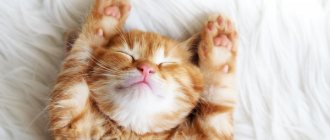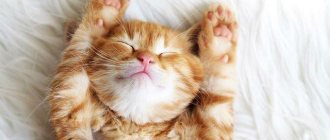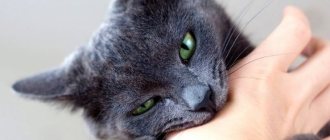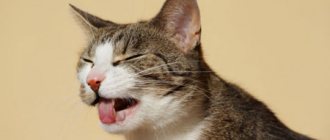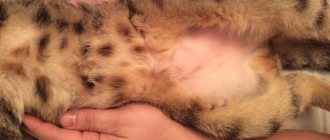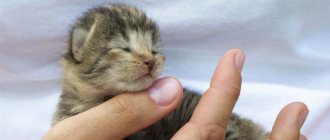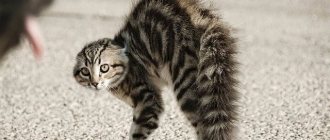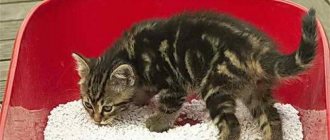Pet lovers sometimes notice that a cat breathes with its tongue hanging out. In most cases, this phenomenon touches the owners. They simply don't care about it. But there are also breeders who closely monitor the cat’s behavior. So, sticking out a pet's tongue makes them panic. But should you worry if a cat sticks out its tongue, and what are the reasons for this?
Language functions
To understand why a cat sticks out its tongue, you first need to understand what functions this muscular organ performs. A cat's tongue performs a number of important functions:
- helps in the process of swallowing, nutrition;
- allows you to recognize the taste of food;
- allows for hygiene procedures.
In its normal state, the tongue is located in the mouth. But there are times when the owner complains that the cat constantly sticks his tongue out. But this phenomenon is not always considered pathological. There are also physiological reasons why a cat sticks out the tip of its tongue.
Why does a cat stick out its tongue?
The cat's tongue is structured in a special way and is not like the tongues of most domestic animals: its surface is not smooth, but consists of a large number of hard, spine-like villi. This configuration of lingual papillae makes the tongue look like a kind of brush that a cat uses to clean its fur from lost hairs, dirt or food debris.
Fur on the surface of the tongue
If the cat continues to lick its fur almost immediately, there is no cause for concern.
: most likely, during a particularly intensive cleaning of the fur, the animal simply forgot to remove its “brush”.
Deep relaxation
Owners of cats notice that the animal shows the tip of its tongue after being petted: petted and scratched in the area of the ears and chin. Some cats find this so relaxing that they are simply unable to retract their tongue into their mouth.
This happens if the animal is very sound asleep. In this case, the cats' paws twitch, the muscles around the nose and mouth contract, and the tongue sticks out half or a third.
Food related inconveniences
Sometimes, by sticking out its tongue, the cat tries to get rid of pieces of food. Food may taste bad or get stuck between your teeth. If this behavior continues for several minutes, you need to carefully examine the animal's oral cavity and remove the stuck foreign object. If nothing is found during examination, the pet should be taken to the veterinarian immediately.
Physiological reasons
Veterinarians identify the reasons why a cat sticks out its tongue:
- Relaxation. During rest and sleep, the jaw muscles are maximally relaxed, which leads to prolapse of the muscular organ.
- Thermoregulation. If a cat is hot, it sticks out its tongue, thereby trying to normalize the temperature.
- Absent-mindedness. A cat may simply forget to retract its tongue after licking fur or active games.
- Bite. Due to malocclusion, the tongue simply does not fit in the cat’s mouth. That's why it sticks out. Such pets do not qualify for participation in competitions and exhibitions based on their appearance.
- Childbirth. Before the expected birth, the cat's behavior changes. She becomes excited, her breathing quickens, her mouth is slightly open, her tongue sticks out.
- Praise. The cat sticks out its tongue in response to praise. If the owner is constantly touched by the sight of a cat with a hanging tongue, then the animal will systematically carry out such an action for the sake of approval.
- Hunting. When hunting, cats involuntarily stick out the tip of their tongue. This is due to the fact that in this position of the muscular organ the animal’s sense of smell increases.
- Age. A cat who has crossed the age of 8 may have loose teeth and fall out. From the cracks that appear, the tongue freely looks out of the oral cavity.
Interesting fact: scientists were able to prove that a cat’s tongue grows by several millimeters during sleep. Therefore, during rest, the owner may notice the tip of the pet’s tongue sticking out.
Mr. Cat explains: diseases
But in some cases, a protruding tongue indicates the presence of certain pathologies in the animal.
If for no apparent reason your pet sits like this for a long time, this is a reason to sound the alarm and go to the veterinary clinic.
Respiratory diseases
A sign of many respiratory diseases and colds is a protruding tongue. These can be acute respiratory viral diseases, rhinitis, tracheitis, bronchitis, pneumonia. The situation is aggravated by coughing, sneezing, shortness of breath, wheezing and wheezing, as well as mucus flowing from the nose.
Cardiovascular failure
With vascular pathologies, breathing problems always arise, since all tissues of the body do not receive enough oxygen.
If you experience severe shortness of breath with a protruding tongue, which is a sign of cardiomyopathy, pulmonary edema may develop. The animal breathes through its belly.
Other symptoms include loss of appetite, blue discoloration of the mucous membranes of the mouth, wheezing when breathing, tachycardia, and impaired coordination of movements.
Coronary heart disease, angina pectoris, hypertension can also be accompanied by the cat's tongue sticking out during rapid breathing.
Poisoning
In case of poisoning, the pet experiences the urge to vomit, causing the tip of the tongue to stick out. This symptom is usually accompanied by other dyspeptic symptoms - bloating, drooling, diarrhea.
Kidney failure
If the tongue sticks out due to kidney failure, then the pet most likely also has a strong ammonia odor from the mouth, increased thirst and a frequent urge to urinate.
Nausea and diarrhea, yellowness of the mucous membranes of the mouth, oily hair, lethargy and apathy may be added.
Infectious diseases
With infectious and viral diseases of cats, the picture is almost the same as with colds. But conjunctivitis, painful crusts on the nose and ulcers around the mouth are added. These may be rhinotracheitis and calcivirosis.
Inflammation in the mouth
The first thing to do if your pet is breathing heavily for no apparent reason, sticking out his tongue, is to examine the oral cavity. If there are ulcers and sores there, then it is most likely gingivitis or stomatitis.
Added to the symptoms are an unpleasant putrid odor from the mouth, decreased appetite, and refusal of solid food.
Tumors
Malignant tumors such as cancer of the tongue, throat, palate, and jaws can cause involuntary frequent protrusion of a cat's tongue.
The situation is aggravated by bleeding, severe bad breath, hoarseness, and refusal to eat.
A similar picture may occur with benign formations, for example, polyps.
Increased body temperature
A protruding tongue can occur not only due to external heat; fever also forces the animal to look for an opportunity to cool down. And high temperature, in turn, serves as a concomitant symptom of many diseases.
Functional brain disorders
If your pet has a brain tumor or head injury, then a constantly protruding tongue will certainly be added to the lack of coordination of movements, lethargy and general decreased tone.
Foreign body
A protruding tongue can serve as a signal that the cat has swallowed some small object and it is stuck in the teeth or respiratory tract, preventing the full supply of oxygen to the lungs.
In this case, there may be salivation and lacrimation, sneezing, coughing, mucus discharge from the nose, and refusal to eat.
Allergy
This reaction is often accompanied by swelling of the airways and larynx, which causes shortness of breath, difficulty breathing and, as a result, a protruding tongue.
Injuries
Jaw injuries can cause a similar reaction. When it is dislocated, the cat cannot close its mouth at all, there is also drooling and a complete refusal to eat.
Stress
The cause may be stress in cats. We will look at the symptoms and treatment below.
If the pet is stressed, the tongue will stick out. For example, when driving a car, if the cat is afraid, then the tongue will hang out the whole way. Fear, nervous shock, negative emotions are the reasons that cause stress in cats. When an animal is nervous, the following symptoms appear:
- tongue sticking out;
- the cat is shaking;
- the pet is trying to hide;
- meows constantly.
If the cat is scared, the symptoms may recur. Therefore, the animal requires treatment. He needs to be provided with complete rest. If necessary, the veterinarian will prescribe sedatives.
What diseases can a protruding tongue be a symptom of?
This phenomenon in cats may be a sign of the following diseases:
- Runny nose. Losing the ability to breathe freely through the nose, animals use the oral cavity.
- Pathologies of the respiratory system. Mouth breathing, tongue protruding, wheezing or shortness of breath are symptoms that require immediate examination of your pet.
- Heart failure. If your four-legged pet is breathing heavily, walking with his mouth open after even minor physical exertion, and his tongue and gums have acquired a bluish tint, he most likely has problems with his heart.
- Intoxication of the body. In addition to the protruding tongue, the poisoned animal experiences repeated vomiting, lethargy, and loss of interest in food. If measures are not taken in a timely manner to eliminate the consequences of poisoning, the cat may die from dehydration.
- Infections. Such dangerous infectious pathologies as rhinotracheitis and calicivirosis are accompanied by fever, sneezing and nasal congestion, as a result of which the pet sticks out its tongue.
- Inflammatory processes in the oral cavity. Other symptoms will also indicate dental problems: apathy, loss of interest in food, especially dry food.
- Increased body temperature due to heatstroke or viral infection.
- Nervous disorders. Muscle cramps, incoordination of movements, squint, involuntary urination and bowel movements are alarming symptoms. A protruding tongue may indicate the imminent death of a four-legged pet.
- Neoplasms in the nasal cavity that complicate the cat's nasal breathing.
- Impaired kidney function. In addition to a protruding tongue, signs of renal failure in representatives of the cat family are: ammonia-like breath, increased thirst, deterioration of vision and the condition of hair and skin, vomiting, diarrhea, yellowness of the mucous membranes, increased urination, loss of body weight, swelling of the abdomen.
Diseases
Veterinarians identify the main reasons why a cat sticks out its tongue:
- allergies that cause swelling of the throat;
- inflammation of the gums, mouth;
- dental diseases;
- amyotrophy;
- improper functioning of the salivary gland;
- skull injuries.
You can often see a cat with its tongue hanging out after anesthesia. During this period, the animal cannot yet control its jaw independently. The oral cavity closes completely only 24 hours after surgery.
Why does a cat stick out its tongue?
Unlike dogs, which regulate their body temperature with an open mouth, cats prefer to literally keep their tongues shut.
However, in some cases, you can see that the cat is breathing like a dog. When can this happen and what should you pay attention to? A cat may stick out its tongue for a variety of reasons
:
- Forgetfulness. Most often, after washing, the cat simply forgets to hide the “comb”. This can happen if the cat “daydreams” or is suddenly distracted during a hygiene procedure by a sound or an interesting action.
- Muscle relaxation. You can often notice a tongue falling out of the mouth while your pet is sleeping. This occurs due to complete relaxation of the muscles. This means that the pet is in a deep stage of sleep.
- Incorrect bite. First of all, owners of purebred cats with a shortened muzzle should pay attention to this feature. For example, for Persians, sticking out the tongue is the norm. Your pet may also have a jaw that is moved forward or backward. If the cat does not experience discomfort, it is not necessary to straighten the bite.
- Emotions. Each pet is individual, and it is possible that a cat, by sticking out its tongue, demonstrates strong emotions. This could be excitement or a sign of sympathy.
In most cases, it is easy enough to touch the tip of the tongue, and the problem will solve itself: the cat will lick itself and remove the tongue. However, there are other cases.
- Stomatitis. With inflammation and swelling of the throat or mucous membranes of the cheeks and gums, the tongue simply does not fit in the swollen mouth. In addition, wounds blown with air stop hurting too much. In addition to stomatitis, swelling may indicate periodontitis, gingivitis, and toothache.
- Tumor. Various diseases from viral infection to kidney failure can manifest as nodules or ulcers on the gums. Seals or pain prevent the mouth from closing completely, and the cat is forced to walk with its tongue hanging out. In this case, you should examine the animal's mouth. If you notice bruises, ulcers, or protrusions, contact your veterinarian. A blood test will be required to make an accurate diagnosis.
- Frequent breathing. An open mouth and breathing “like a dog” do not always indicate thermoregulation. For no apparent reason, shortness of breath can be a symptom of allergic edema, jaw injury, heart failure, runny nose, or bronchitis.
You should not diagnose a cat yourself, much less treat an animal based on advice from the Internet. If your pet suddenly starts walking with its tongue hanging out for no apparent reason, take the animal to the vet.
Where are dogs' belly buttons?
How to make friends between a cat and a dog? Why does a hedgehog laugh? The entire encyclopedia about animals is on our website.
Source
Signs of diseases
Veterinarians identify a number of symptoms that, together with a protruding tongue, indicate various diseases:
- difficulty breathing;
- the cat is lethargic and does not play;
- the pet becomes aggressive;
- the oral mucosa is red, and sometimes a bluish tint appears;
- dry mucous membrane;
- lack of appetite;
- wounds, mouth ulcers.
If your cat develops the above symptoms, you need to immediately take him to the clinic for examination.
What is considered normal
Natural reasons for the tongue to fall out of the mouth are forgetfulness (for example, when licking) and relaxation of the pet, when the tongue lengthens and can stick out. In addition, in stressful situations and nervous tension, the cat may clamp its tongue between its teeth. This can also be observed with an incorrect bite or in the event of a change of teeth (in kittens). It is also considered normal to bite the tongue in hot weather or during labor, when the cat is trying to alleviate pain.
Natural causes should not bother the owner
A cat with its tongue hanging out is a very cute sight, but owners of furry pets should take a closer look at the animal, especially if this behavior has been observed for a long time. If the pet shows its tongue in cases that are considered non-critical, immediately puts it in its mouth when the condition has stabilized and looks healthy and cheerful, then there is nothing to worry about.
But if it is difficult for a cat to control his tongue, and uncharacteristic changes are noted in his behavior (hoarseness of voice, difficulty breathing and lack of appetite), then it is necessary to urgently contact a veterinary clinic. If the correct diagnosis is carried out in a timely manner and emergency care is provided to the animal, this can save its life. Particular attention should be paid to baby kittens and older cats, as it is most difficult for them to point out the problem and tolerate painful conditions.
Heat
The main physiological reason why a cat sticks out its tongue is temperature regulation. The animal protrudes the organ to reduce discomfort, for example, during heat. This prevents the development of heat stroke. In this case, the owner should take the cat to a cool place and pour water on it.
But a cat's tongue sticking out can also be a signal of high body temperature. To understand whether your pet is suffering from heat or is sick, you need to figure out what temperature is considered normal in cats.
The normal temperature for a cat is 38-39 degrees. But don’t panic right away if the indicator deviates slightly from the norm. Here are the common reasons for the thermometer to shift:
- immediately after sleep, the thermometer drops by a couple of divisions;
- in the evening the cat’s body temperature will be higher than in the morning;
- Kittens have a slightly higher temperature than adult animals.
If the temperature rises due to illness, you should not self-medicate - the animal should be taken to the veterinarian.
Individual behavioral characteristics
Cats, like any other pets, have different temperaments: some are aggressive and cocky, others are extremely affectionate and loving. Some cats love to lick not only themselves, but also the object of their adoration (the owner, another pet, toys, clothes). Intense licking promotes not only intense salivation, but also periodic protruding of the tongue.
Health problems
If the protruding tongue and excessive salivation are not associated with licking, or the animal showing the tongue is apathetic or acting unusually, the causes of the cat's "grimaces" should be sought together with a veterinarian.
Oral diseases
Problems in the oral cavity cause discomfort and pain to the cat, which he tries to get rid of by sticking out his tongue. The animal should be checked for:
Heatstroke
Motion sickness
Unlike humans, motion sickness in cats has not only physiological causes, and a protruding tongue is not always a consequence of nausea from rapid movement. Motion sickness in cats sometimes has an emotional overtone:
· unfamiliar frightening environment;
· strong emotional experience.
Poisoning
Respiratory infections
Difficulty breathing often occurs due to nasopharyngeal infections. Sticking out its tongue, the animal will try to take a deep breath.
Is your cat showing his tongue? Make sure that he has no discomfort or health problems, then hurry up and take a photo that is sure to bring a smile to anyone who looks at it.
SUBSCRIBE to
the channel so as not to miss Interesting articles! I would be grateful if you would LIKE, click on “thumbs up” or share this post with your friends on social networks.
Source
Cardiovascular diseases
The heart is an important organ. Any disturbances in the functioning of the cardiovascular system are dangerous to the life of the animal. Due to chronic or acute heart disease, oxygen does not reach vital organs in sufficient quantities.
Improper heart function is accompanied by symptoms:
- the cat is lethargic, there is practically no movement;
- heart rhythm is abnormal;
- rapid breathing;
- tongue sticking out;
- The oral mucosa has a bluish tint.
Any disturbance in breathing or heart rhythm is a signal from the cat’s body about the need to visit a veterinarian. Lack of help can lead to the death of the animal.
Features of the structure of the cat’s oral cavity and its tongue
The oral cavity of representatives of this family is formed:
- The tongue, which is an elongated movable organ located at the bottom of the mouth, with its base attached to the body of the hyoid bone, and the free tip located in the anterior zone of the jaw. On its surface there are papillae - special mushroom-shaped structures with tiny holes or pores leading to taste buds. The tongue is predominantly formed by bundles of muscles, which are interspersed with hard connective and fatty tissue. It is penetrated by many blood vessels. It is surrounded by the openings of the ducts of the salivary glands, through which saliva enters the oral cavity. This organ is responsible for many functions: moving food in the mouth, helping with chewing and swallowing, delivering liquid to the oral cavity when drinking, determining the taste of food through taste buds, regulating body temperature (by moving over the tongue in the back and front directions, the air is cooled , evaporating saliva), cleaning the fur.
- Teeth located along the outer boundaries of the oral cavity, the upper of which are fixed in the maxillary bone, and the lower ones in the mandibular bone. Each of these bone formations consists of pulp, dentin, enamel and cementum. The tooth root is held in the bony socket of the jaw by periodontal ligaments of connective tissue. One tooth may have one or more roots. Kittens have 26 milk units, adult animals have 30 permanent ones: 12 sharp incisors, 4 long canines, 10 premolars, 4 molars. Functions of teeth: grinding and chewing food. The incisors are responsible for biting off food, the canines are for piercing and tearing it, the premolars are for rubbing, grinding and chewing food, and the molars are for final chewing.
- The mouth, used for receiving food and its primary processing. It is the gateway to the gastrointestinal tract. A cat's mouth is located in the lower front part of the snout between the maxillary and mandibular bones. It is formed by the space behind the teeth and gums, lips and cheeks. The main part of the mouth is bounded above by the hard and soft palate, on the sides and in front by the teeth and lips, and below by the tongue and adjacent tissues. The mouth is responsible for the production and secretion of saliva, which moistens food and helps form portions of it. It contains enzymes that help digest food and cleanses the tongue. Through the mouth, additional oxygen is supplied to the cat's respiratory system if necessary.
- Membranous mucous membrane. The upper part of the oral cavity is the palate. Its anterior part, which is formed by mucous-covered bone, is the hard palate, separating the oral cavity and nasal passages. The soft posterior region is the soft palate formed by the flexible fold of mucous membrane between the back of the mouth and nasal cavity.
- The lips, with the help of which the animal picks up food, throwing it into the oral cavity.
- Cheeks.
- Numerous small glands, including the sublingual salivary gland, which is located under the tongue.
Poisoning
Poor nutrition and poor quality food can lead to poisoning of your pet. The owner may notice characteristic symptoms:
- cough;
- urge to vomit;
- vomit;
- bloating;
- diarrhea;
- increased intestinal motility;
- gurgling in the stomach.
Due to frequent vomiting, the cat sticks out its tongue. Since pathological signs are present, it is impossible to confuse cat diseases with a physiological norm.
Why does the cat show his tongue?
Dedicated to all lovers of the cat family, of all types of shapes and colors.
Have you ever wondered why a lion in a zoo, or a lynx in a nature reserve, or even your domestic “door terrier”, being by nature completely opposite to the essence of a dog, but from time to time for some reason stick out their tongue at us.
Moreover, domestic cats do this more often than their wild relatives. So let's look at what in their behavior makes them sometimes resemble dogs:
Functional brain disorders
Veterinarians identify the causes that lead to disruption of the brain and nervous system:
- traumatic brain injury;
- past infectious diseases;
- stroke.
The above reasons lead to a lack of coordination: the cat cannot independently control movements or control muscles. So he sticks out his tongue.
Veterinarians offer a small test that helps make sure that your cat has no neurological problems. If the animal sticks out its tongue, you need to touch it a little. If there are no neurological problems, the cat will quickly hide its tongue. If the actions do not bring results, we can talk about a pathological signal from the body.
Why doesn’t the animal remove its tongue and even bite it?
The reasons why representatives of the cat family constantly stick out their tongues, as a result of which they sometimes bite it:
Persian cat
- Special structure of the muzzle. There are cat breeds with a flattened muzzle. This structure is called brachycephalic, and animals are called brachycephalic. Animals that have a very short nose are considered flat-faced. They have a widened and flattened skull at the front. Due to genetic characteristics, the bite of some brachycephalics (Persians, Scots, British) is incorrect. The flat structure of the muzzle leads to the fact that the tongue does not fit behind the teeth, protruding slightly forward. An animal that always shows its tongue is not recommended for breeding.
- Mental retardation or complication of TBI. Such animals almost always have a limp tongue. Cats that have suffered a traumatic brain injury may also experience a similar phenomenon.


